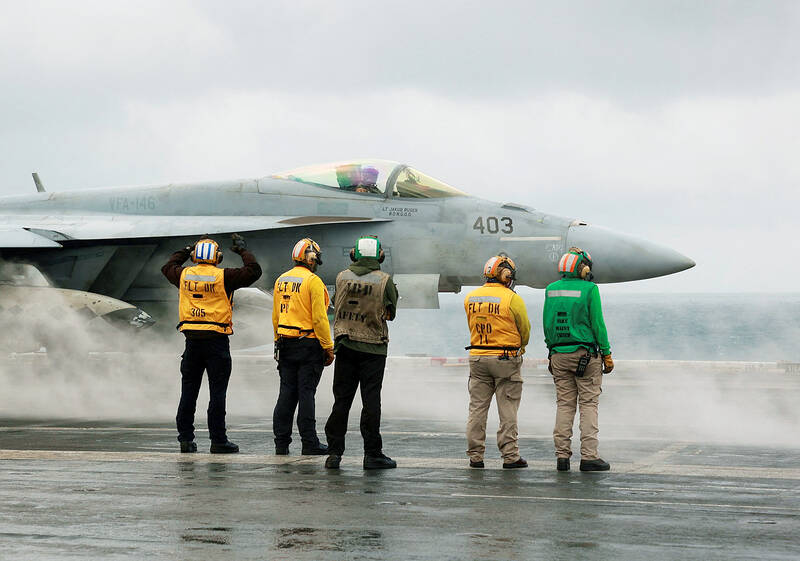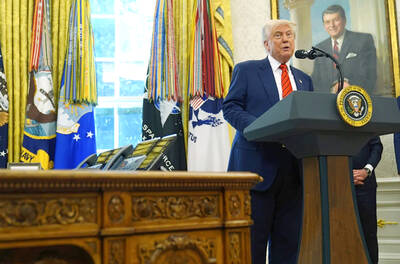The China Coast Guard (CCG) maintained near-daily patrols at key features across the disputed South China Sea last year, ramping up its presence as tensions over the waterway with Southeast Asian neighbors remain high, new tracking data shows.
Patrols in the waters surrounding the Vanguard Bank off Vietnam, an area known for its oil and gas reserves and the site of repeated standoffs between Chinese and Vietnamese vessels, more than doubled to 310 days last year, the Washington-based Asia Maritime Transparency Initiative said.
The number of days Chinese ships patrolled near Second Thomas Shoal (Renai Shoal, 仁愛暗) in the Spratly Islands (Nansha Islands, 南沙群島), which Taiwan also claims and where the Philippines maintains a garrison, increased to 279 from 232, while those at Luconia Shoals, near important Malaysian oil and gas operations, rose to 316 from 279, the analysis showed.

Photo: Reuters
The patrols show that Beijing’s determination to assert control over its claim to more than 80 percent of the South China Sea, the analysis of ship identification data says, and raises the risk of a mishap at sea that regional officials worry could lead to a larger conflict.
“With CCG vessels operating in Malaysian, Philippine and Vietnamese waters every day of the year, it all but guarantees tensions remain high and run-ins with those neighbors a regular occurrence,” said Greg Poling, head of the Southeast Asia program at Washington’s Center for Strategic and International Studies.
The report said that its count of Chinese incursions are probably incomplete, because not all ships employ the transceivers used to track their whereabouts, and some try to obscure their identities with false data.
Poling said the Chinese patrols are becoming a fact of life in the region.
“The patrol locations have been extremely consistent in recent years, creating a predictable status quo that the Southeast Asian parties can manage, albeit with difficulty,” he said.
The analysis of China’s actions comes as US Secretary of Defense Lloyd Austin makes his sixth trip to the Indo-Pacific region this week. The Pentagon head is to meet with his counterpart in South Korea in an effort to bolster the security environment in the region.
Austin is then expected to visit the Philippines, where he is poised to secure expanded access to key military bases, the Washington Post reported, adding that negotiations are still ongoing.
The number of high-level engagements between Washington and Manila has increased under Philippine President Ferdinand Marcos Jr, and the two sides have agreed to speed up existing military projects and undertake new ones under an existing defense pact.
The Philippines last month ordered the military to strengthen its presence in the South China Sea after repeatedly voicing displeasure with incursions by the Chinese People’s Liberation Army (PLA). Vietnam and Indonesia are also bolstering their own defenses.
A senior US defense official last month said that the PLA has generally become more reckless toward US and allied partners in the South China Sea as it increases its military capacity, directing chaff toward other planes and having its ships cut across the bows of foreign vessels.
The same official said that the Pentagon is struggling to get Beijing to resume military-to-military talks after the PLA in December last year held its largest drills near Taiwan since the unprecedented exercises that followed then-US House of Representatives speaker Nancy Pelosi’s visit in August.
“When there’s no trust, when there’s no communication between nations, when you have two fighter jets flying closely in the air like we had very recently over the South China Sea, that could escalate very quickly if one of the pilots has a quick trigger and makes a mistake,” said Stephen Roach, author of Accidental Conflict.

A new online voting system aimed at boosting turnout among the Philippines’ millions of overseas workers ahead of Monday’s mid-term elections has been marked by confusion and fears of disenfranchisement. Thousands of overseas Filipino workers have already cast their ballots in the race dominated by a bitter feud between President Ferdinand Marcos Jr and his impeached vice president, Sara Duterte. While official turnout figures are not yet publicly available, data from the Philippine Commission on Elections (COMELEC) showed that at least 134,000 of the 1.22 million registered overseas voters have signed up for the new online system, which opened on April 13. However,

ALLIES: Calling Putin his ‘old friend,’ Xi said Beijing stood alongside Russia ‘in the face of the international counter-current of unilateralism and hegemonic bullying’ Chinese President Xi Jinping (習近平) yesterday was in Moscow for a state visit ahead of the Kremlin’s grand Victory Day celebrations, as Ukraine accused Russia’s army of launching air strikes just hours into a supposed truce. More than 20 foreign leaders were in Russia to attend a vast military parade today marking 80 years since the defeat of Nazi Germany in World War II, taking place three years into Russia’s offensive in Ukraine. Putin ordered troops into Ukraine in February 2022 and has marshaled the memory of Soviet victory against Nazi Germany to justify his campaign and rally society behind the offensive,

CONFLICTING REPORTS: Beijing said it was ‘not familiar with the matter’ when asked if Chinese jets were used in the conflict, after Pakistan’s foreign minister said they were The Pakistan Army yesterday said it shot down 25 Indian drones, a day after the worst violence between the nuclear-armed rivals in two decades. Pakistani Prime Minister Shehbaz Sharif vowed to retaliate after India launched deadly missile strikes on Wednesday morning, escalating days of gunfire along their border. At least 45 deaths were reported from both sides following Wednesday’s violence, including children. Pakistan’s military said in a statement yesterday that it had “so far shot down 25 Israeli-made Harop drones” at multiple location across the country. “Last night, India showed another act of aggression by sending drones to multiple locations,” Pakistan military spokesman Ahmed

US President Donald Trump on Wednesday said that he would make a decision about how the US government would refer to the body of water commonly known as the Persian Gulf when he visits Arab states next week. Trump told reporters at the White House that he expects his hosts in Saudi Arabia, Qatar and the United Arab Emirates will ask him about the US officially calling the waterway the Arabian Gulf or Gulf of Arabia. “They’re going to ask me about that when I get there, and I’ll have to make a decision,” Trump said. “I don’t want to hurt anybody’s